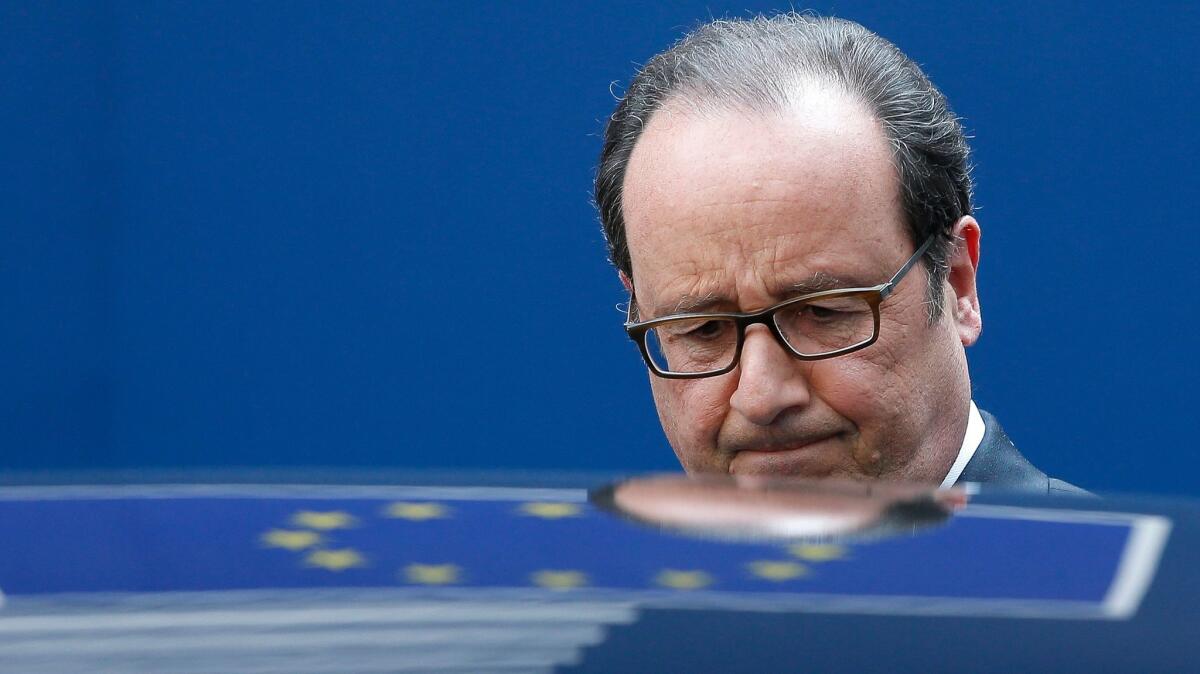European Union leaders — minus Britain — gather ahead of ‘Brexit’ negotiations to plot their moves

- Share via
Reporting from Brussels — Heads of state from 27 European Union countries — all except British Prime Minister Theresa May — put on a display of unity Saturday ahead of negotiations over Britain’s divorce from the bloc, colloquially known as “Brexit.”
Gathered in a meeting room at the European Council headquarters in Brussels, the leaders agreed on their priorities within one minute, a spokesman for the EU institution said.
Discussions regarding Britain’s withdrawal from the EU are set to start after the U.K. parliamentary election in June and last until March 2019.
The remaining 27 countries were eager to show there are no cracks in their negotiating position and meant to make one thing clear to London: The bloc will not split off into opposing groups that disagree over how to treat its departing member.
The leaders rubber-stamped a list of demands, including protecting the 3 million EU citizens living in Britain, a guarantee to keep peace in Northern Ireland and a budget settlement from Britain estimated to be more than $60 billion.
“It is with unity that Europe will preserve its interests,” French President Francois Hollande told reporters after the summit.
“There was some concern that the U.K. will try to approach the negotiations with divide-and-rule tactics,” said Agata Gostyńska, a senior fellow at the Center for European Reform, a London-based think tank. “The EU has something big at stake. It’s the EU’s fate. This is one of Germany’s priorities, to keep the EU united.”
Earlier this week, German Chancellor Angela Merkel warned that Britain will feel the difference once it leaves the union because it no longer can have the same advantages.
Gostyńska said leaders are afraid that conceding too much to the U.K. in Brexit negotiations could set a dangerous example.
“This could open a window of opportunity for some of the other member states to say, ‘Look, if the U.K. can still have this good deal and enjoy a very favorable access to the single market, then why shouldn’t we go down the same path?’ ” she said.
But despite the EU’s strong positioning, Merkel emphasized at the summit that the union is “not allied against the United Kingdom” — a veiled response to May’s warning from the campaign trail this week that EU countries are ready to “line up to oppose us.”
Officials at the EU institutions in Brussels were quick to flaunt their resolve, which they said was a sharp contrast to the British government.
“It took the U.K. nine months to prepare the notification letter after Article 50,” a senior EU official said before the summit, referencing May’s letter to officially start the Brexit process in March. “Twenty-seven heads of state and government will have their position on Brexit adopted only one month later.”
It is with unity that Europe will preserve its interests.
— French President Francois Hollande
U.K. citizens voted to leave the 28-country European Union in a June 2016 referendum, propelling shocked leaders into preparations to remove the country from the bloc, which it joined in 1973.
The document outlining the EU’s position for negotiations says that the talks can move into a second phase only once the U.K. shows “sufficient progress” on the 27 leader’s first three priorities. May originally wanted the talks to simultaneously decide on criteria for Britain’s exit as well as a future trade agreement — but the EU shut down her request.
Irish Prime Minister Enda Kenny secured a victory Saturday by inserting a statement into the summit minutes guaranteeing that if Northern Ireland unites with the Republic of Ireland, the country would automatically be an EU member. Northern Ireland, a part of the U.K., voted to remain in the EU last year with a majority of 56%. But polls show that most people still would reject a bid to unite with the Republic of Ireland.
Kenny called the reference to a united Ireland a “significant legal statement from the European Council for something that may happen.”
But he warned that the talks are unlikely to remain as quick as they were on Saturday.
“We won’t always be as calm and measured as today, I foresee,” he said.
Unity between EU countries is fragile, and Brexit negotiations, as they drag on and become more complex, still could drive leaders of the 27 member states apart.
Jean-Claude Juncker, the president of the European Commission, the EU’s executive arm, said he is concerned the countries will face tough decisions over a shared budget once Britain leaves. The U.K. is one of the top contributors to the EU budget; its exit will leave a hole of around 18 billion euros per year, according to 2015 figures. Other member states will need to pay more to make up for the loss.
“Clearly there are those who don’t want to pay a penny more and those who don’t want to give up a penny either,” Juncker said after the summit.
EU leaders face another threat to their unity next week when French voters elect a new president. Marine Le Pen, who will face off against Emmanuel Macron, has promised to take France out of the EU.
“The consequences would be serious if France turned away from the EU,” Hollande warned in his final EU news conference Saturday. “The choice of the French people is a choice for France, but also for the EU.”
Stupp is a special correspondent.
More to Read
Sign up for Essential California
The most important California stories and recommendations in your inbox every morning.
You may occasionally receive promotional content from the Los Angeles Times.










